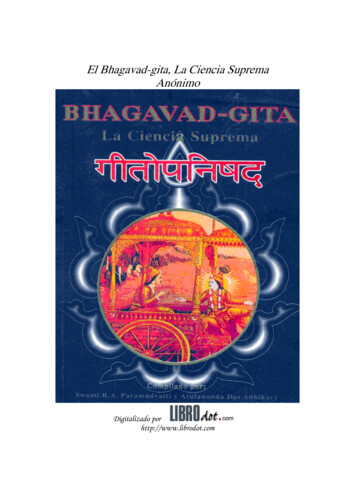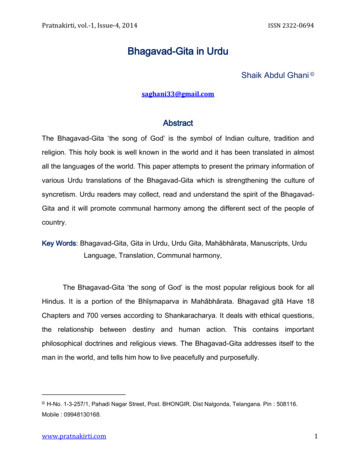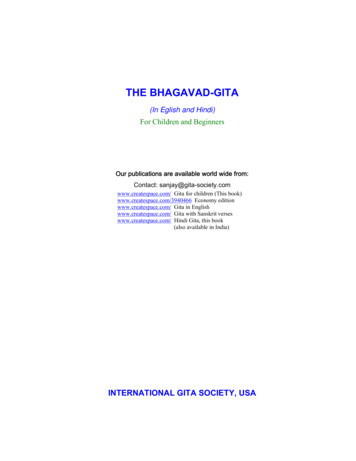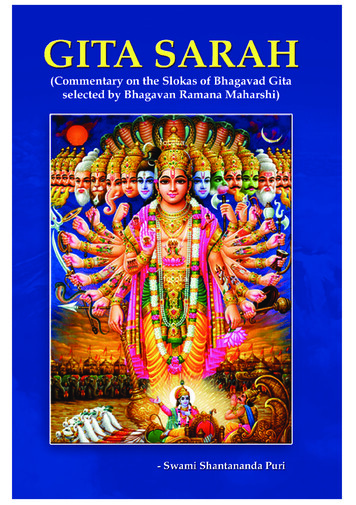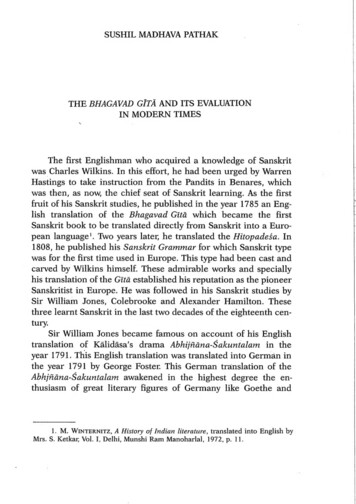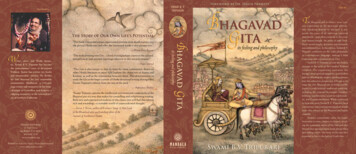
Transcription
TheBhagavadGitaTranslation by Shri Purohit Swami.
A NOTE ABOUT THE TRANSLATORShri Purohit Swami was born into a religious and wealthy family in Badners, India, in1882. He studied philosophy and law, received his LL.B. from Decan College, Poona,married and had three children. However, he did not practice law, and instead spenthis entire life in spiritual devotion. He wrote in his native Marathi, in Hindi, Sanskritand English – poems, songs, a play, a novel, a commentary on The Bhagavad Gita and anautobiography. He left India in 1930 at the suggestion of his Master to interpret thereligious life of India for the West, and made his new home in England. It was here thathe produced beautiful translations of The Bhagavad Gita, Patanjali’s Aphorisms of Yogaand – in collaboration with his great friend, the Irish poet W.B. Yeats – The Ten PrincipalUpanishads. He died in 1946.
CONTENTSONE: THE DESPONDENCY OF ARJUNA . 1TWO: THE PHILOSOPHY OF DISCRIMINATION. 4THREE: KARMA-YOGA – THE PATH OF ACTION . 9FOUR: DNYANA-YOGA – THE PATH OF WISDOM. 12FIVE: THE RENUNCIATION OF ACTION. 15SIX: SELF-CONTROL . 17SEVEN: KNOWLEDGE AND EXPERIENCE . 20EIGHT: LIFE EVERLASTING. 22NINE: THE SCIENCE OF SCIENCES ANDTHE MYSTERY OF MYSTERIES . 24TEN: THE DIVINE MANIFESTATIONS . 27ELEVEN: THE COSMIC VISION. 30TWELVE: BHAKTI-YOGA – THE PATH OF LOVE. 34THIRTEEN: SPIRIT AND MATTER . 36FOURTEEN: THE THREE QUALITIES . 39FIFTEEN: THE LORD-GOD. 41SIXTEEN: DIVINE AND DEMONIC CIVILIZATION. 43SEVENTEEN: THE THREEFOLD FAITH . 45EIGHTEEN: THE SPIRIT OF RENUNCIATION. 47
PREFACEThe Bhagavad Gita, the greatest devotional book of Hinduism, has long been recognizedas one of the world’s spiritual classics and a guide to all on the path of Truth. It issometimes known as the Song of the Lord or the Gospel of the Lord Shri Krishna.According to Western scholarship, it was composed later than the Vedas and theUpanishads – probably between the fifth and second centuries before Christ. It is afragment, part of the sixth book of the epic poem The Mahabaratha.The Mahabaratha tells of the Pandavas, Prince Arjuna and his four brothers, growing upin north India at the court of their uncle, the blind King Dhritarashtra, after the death oftheir father, the previous ruler. There is always great rivalry between the Pandavas or sonsof Pandu and the Kauravas, the one hundred sons of Dhritarashtra. Eventually the oldking gives his nephews some land of their own but his eldest son, Duryodhana, defeatsYudhisthira, the eldest Pandava, by cheating at dice, and forces him and his brothers tosurrender their land and go into exile for thirteen years. On their return, the old king isunable to persuade his son Duryodhana to restore their heritage and, in spite of efforts atreconciliation by Sanjaya, Dhritarashtra’s charioteer; by Bheeshma, his wise counsellor;and even by the Lord Krishna himself, war cannot be averted. The rival hosts face eachother on the field of Kurukshetra. It is at this point that The Bhagavad Gita begins.When Prince Arjuna surveys the battlefield, he is overwhelmed with sorrow at thefutility of war. The teachings of The Bhagavad Gita are spoken by the divine Lord Krishna,who is acting as the prince’s charioteer. They are overheard by Sanjaya and reported backto King Dhritarashtra. When Krishna has finished speaking to Arjuna, the two armiesengage. The battle lasts eighteen days and by the end of it nearly all of the warriors onboth sides are dead save Krishna and the five sons of Pandu.
1ONE: THE DESPONDENCY OF ARJUNAThe King Dhritarashtra asked: “O Sanjaya! What happened on the sacred battlefield ofKurukshetra, when my people gathered against the Pandavas?”Sanjaya replied: “The Prince Duryodhana, when he saw the army of the Pandavas paraded,approached his preceptor Guru Drona and spoke as follows:Revered Father! Behold this mighty host of the Pandavas, paraded by the son of KingDrupada, thy wise disciple.In it are heroes and great bowmen; the equals in battle of Arjuna and Bheema,Yuyudhana, Virata and Drupada, great soldiers all;Dhrishtaketu, Chekitan, the valiant King of Benares, Purujit, Kuntibhoja, Shaibya – amaster over many;Yudhamanyu, Uttamouja, Soubhadra and the sons of Droupadi, famous men.Further, take note of all those captains who have ranged themselves on our side, O best ofSpiritual Guides! The leaders of my army. I will name them for you.You come first; then Bheeshma, Karna, Kripa, great soldiers; Ashwaththama, Vikarna andthe son of Somadhatta;And many others, all ready to die for my sake; all armed, all skilled in war.Yet our army seems the weaker, though commanded by Bheeshma; their army seems thestronger, though commanded by Bheema.Therefore in the rank and file, let stand firm in their posts, according to battalions; and allyou generals about Bheeshma.Then to enliven his spirits, the brave Grandfather Bheeshma, eldest of the Kuru-clan, blew hisconch, till it sounded like a lion’s roar.And immediately all the conches and drums, the trumpets and horns, blared forth in tumultuousuproar.Then seated in their spacious war chariot, yoked with white horses, Lord Shri Krishna and Arjunasounded their divine shells.Lord Shri Krishna blew his Panchajanya and Arjuna his Devadatta, brave Bheema his renownedshell, Poundra.The King Dharmaraja, the son of Kunti, blew the Anantavijaya, Nakalu and Sahadeo, the Sugoshand Manipushpaka, respectively.And the Maharaja of Benares, the great archer, Shikhandi, the great soldier, Dhrishtayumna, Virataand Satyaki, the invincible,And O King! Drupada, the sons of Droupadi and Soubhadra, the great soldier, blew their conches.1
1The tumult rent the hearts of the sons of Dhritarashtra, and violently shook heaven and earth withits echo.Then beholding the sons of Dhritarashtra, drawn up on the battle- field, ready to fight, Arjuna,whose flag bore the Hanuman,Raising his bow, spoke this to the Lord Shri Krishna: O Infallible! Lord of the earth! Pleasedraw up my chariot betwixt the two armies,So that I may observe those who must fight on my side, those who must fight against me;And gaze over this array of soldiers, eager to please the sinful sons of Dhritarashtra.”Sanjaya said: “Having listened to the request of Arjuna, Lord Shri Krishna drew up His brightchariot exactly in the midst between the two armies,Whither Bheeshma and Drona had led all the rulers of the earth, and spoke thus: O Arjuna! Beholdthese members of the family of Kuru assembled.There Arjuna noticed fathers, grandfathers, uncles, cousins, sons, grandsons, teachers, friends;Fathers-in-law and benefactors, arrayed on both sides. Arjuna then gazed at all those kinsmen beforehim.And his heart melted with pity and sadly he spoke: O my Lord! When I see all these, my ownpeople, thirsting for battle,My limbs fail me and my throat is parched, my body trembles and my hair stands on end.The bow Gandeeva slips from my hand, and my skin burns. I cannot keep quiet, for mymind is in tumult.The omens are adverse; what good can come from the slaughter of my people on thisbattlefield?Ah my Lord! I crave not for victory, nor for the kingdom, nor for any pleasure. What werea kingdom or happiness or life to me,When those for whose sake I desire these things stand here about to sacrifice theirproperty and their lives:Teachers, fathers and grandfathers, sons and grandsons, uncles, father-in-law, brothers-inlaw and other relatives.I would not kill them, even for three worlds; why then for this poor earth? It matters not ifI myself am killed.My Lord! What happiness can come from the death of these sons of Dhritarashtra? Weshall sin if we kill these desperate men.We are worthy of a nobler feat than to slaughter our relatives – the sons of Dhritarashtra;for, my Lord, how can we be happy of we kill our kinsmen?Although these men, blinded by greed, see no guilt in destroying their kin, or fightingagainst their friends,2
1Should not we, whose eyes are open, who consider it to be wrong to annihilate our house,turn away from so great a crime?The destruction of our kindred means the destruction of the traditions of our ancientlineage, and when these are lost, irreligion will overrun our homes.When irreligion spreads, the women of the house begin to stray; when they lose theirpurity, adulteration of the stock follows.Promiscuity ruins both the family and those who defile it; while the souls of our ancestorsdroop, through lack of the funeral cakes and ablutions.By the destruction of our lineage and the pollution of blood, ancient class traditions andfamily purity alike perish.The wise say, my Lord, that they are forever lost, whose ancient traditions are lost.Alas, it is strange that we should be willing to kill our own countrymen and commit agreat sin, in order to enjoy the pleasures of a kingdom.If, on the contrary, the sons of Dhritarashtra, with weapons in their hand, should slay me,unarmed and unresisting, surely that would be better for my welfare!”Sanjaya said: “Having spoken thus, in the midst of the armies, Arjuna sank on the seat of thechariot, casting away his bow and arrow; heartbroken with grief.”Thus, in the Holy Book the Bhagavad Gita, one of the Upanishads, in the Science of the SupremeSpirit, in the Art of Self-Knowledge, in the colloquy between the Divine Lord Shri Krishna and thePrince Arjuna, stands the first chapter, entitled: The Despondency of Arjuna.3
2TWO: THE PHILOSOPHY OF DISCRIMINATIONSanjaya then told how the Lord Shri Krishna, seeing Arjuna overwhelmed with compassion, hiseyes dimmed with flowing tears and full of despondency, consoled him:“The Lord said: My beloved friend! Why yield, just on the eve of battle, to this weaknesswhich does no credit to those who call themselves Aryans, and only brings them infamyand bars against them the gates of heaven?O Arjuna! Why give way to unmanliness? O thou who art the terror of thine enemies!Shake off such shameful effeminacy, make ready to act!Arjuna argued: My Lord! How can I, when the battle rages, send an arrow throughBheeshma and Drona, who should receive my reverence?Rather would I content myself with a beggar’s crust that kill these teachers of mine, theseprecious noble souls! To slay these masters who are my benefactors would be to stain thesweetness of life’s pleasures with their blood.Nor can I say whether it were better that they conquer me or for me to conquer them, sinceI would no longer care to live if I killed these sons of Dhritarashtra, now preparing forfight.My heart is oppressed with pity; and my mind confused as to what my duty is. Therefore,my Lord, tell me what is best for my spiritual welfare, for I am Thy disciple. Please directme, I pray.For should I attain the monarchy of the visible world, or over the invisible world, it wouldnot drive away the anguish which is now paralysing my senses.”Sanjaya continued: “Arjuna, the conqueror of all enemies, then told the Lord of All-Hearts that hewould no fight, and became silent, O King!Thereupon the Lord, with a gracious smile, addressed him who was so much depressed in the midstof the two armies.Lord Shri Krishna said: Why grieve for those for whom no grief is due, and yet professwisdom? The wise grieve neither for the dead nor the living.There was never a time when I was not, nor thou, nor these princes were not; there willnever be a time when we shall cease to be.As the soul experiences in this body infancy, youth and old age, so finally it passes intoanother. The wise have no delusion about this.Those external relations which bring cold and heat, pain and happiness, they come andgo; they are not permanent. Endure them bravely, O Prince!The hero whose soul is unmoved by circumstance, who accepts pleasure and pain withequanimity, only he is fit for immortality.4
2That which is not, shall never be; that which is, shall never cease to be. To the wise, thesetruths are self-evident.The Spirit, which pervades all that we see, is imperishable. Nothing can destroy the Spirit.The material bodies which this Eternal, Indestructible, Immeasurable Spirit inhabits are allfinite. Therefore fight, O Valiant Man!He who thinks that the Spirit kills, and he who thinks of It as killed, are both ignorant. TheSpirit kills not, nor is It killed.It was not born; It will never die, nor once having been, can It cease to be. Unborn, Eternal,Ever-enduring, yet Most Ancient, the Spirit dies not when the body is dead.He who knows the Spirit as Indestructible, Immortal, Unborn, Always-the-Same, howshould he kill or cause to be killed?As a man discards his threadbare robes and puts on new, so the Spirit throws off Its wornout bodies and takes fresh ones.Weapons cleave It not, fire burns It not, water drenches It not, and wind dries It not.It is impenetrable; It can be neither drowned nor scorched nor dried. It is Eternal, Allpervading, Unchanging, Immovable and Most Ancient.It is named the Unmanifest, the Unthinkable, the immutable. Wherefore, knowing theSpirit as such, thou hast no cause to grieve.Even if thou thinkest of It as constantly being born, constantly dying, even then, O MightyMan, thou still hast no cause to grieve.For death is as sure for that which is born, as birth is for that which is dead. Thereforegrieve not for what is inevitable.The end and the beginning of beings are unknown. We see only the interveningformations. Then what cause is there for grief?One hears of the Spirit with surprise, another thinks It marvellous, the third listenswithout comprehending. Thus, though many are told about It, scarcely is there one whoknows It.Be not anxious about these armies. The Spirit in man is imperishable.Thou must look at thy duty. Nothing can be more welcome to a soldier than a righteouswar. Therefore to waver in this resolve is unworthy, O Arjuna!Blessed are the soldiers who find their opportunity. This opportunity has opened for theethe gates of heaven.Refuse to fight in this righteous cause, and thou wilt be a traitor, lost to fame, incurringonly sin.Men will talk forever of thy disgrace; and to the noble, dishonour is worse than death.5
2Great generals will think that thou hast fled from the battlefield through cowardice;though once honoured thou wilt seem despicable.Thine enemies will spread scandal and mock at thy courage. Can anything be morehumiliating?If killed, thou shalt attain Heaven; if victorious, enjoy the kingdom of earth. Thereforearise, O Son of Kunti, and fight!Look upon pleasure and pain, victory and defeat, with an equal eye. Make ready for thecombat, and thou shalt commit no sin.I have told thee the philosophy of Knowledge. Now listen and I will explain thephilosophy of Action, by means of which, O Arjuna, thou shalt break through the bondageof all action.On this Path, endeavour is never wasted, nor can it ever be repressed. Even a very little ofits practice protects one from great danger.By its means, the straying intellect becomes steadied in the contemplation of one objectonly; whereas the minds of the irresolute stray into bypaths innumerable.Only the ignorant speak in figurative language. It is they who extol the letter of thescriptures, saying, There is nothing deeper than this.’Consulting only their own desires, they construct their own heaven, devising arduous andcomplex rites to secure their own pleasure and their own power; and the only result isrebirth.While their minds are absorbed with ideas of power and personal enjoyment, they cannotconcentrate their discrimination on one point.The Vedic Scriptures tell of the three constituents of life – the Qualities. Rise above all ofthem, O Arjuna, above all the pairs of opposing sensations; be steady in truth, free fromworldly anxieties and centered in the Self.As a man can drink water from any side of a full tank, so the skilled theologian can wrestfrom any scripture that which will serve his purpose.But thou hast only the right to work, but none to the fruit thereof. Let not then the fruit ofthy action be thy motive; nor yet be thou enamored of inaction.Perform all thy actions with mind concentrated on the Divine, renouncing attachment andlooking upon success and failure with an equal eye. Spirituality implies equanimity.Physical action is far inferior to an intellect concentrated on the Divine. Have recourse thento Pure Intelligence. It is only the petty-minded who work for reward.When a man attains to Pure Reason, he renounces in this world the results of good andevil alike. Cling thou to Right Action. Spirituality is the real art of living.The sages guided by Pure Intellect renounce the fruit of action; and, freed from the chainsof rebirth, they reach the highest bliss.6
2When thy reason has crossed the entanglements of illusion, then shalt thou becomeindifferent both to the philosophies thou hast heard and to those thou mayest yet hear.When the intellect, bewildered by the multiplicity of holy scripts, stands unperturbed inblissful contemplation of the Infinite, then hast thou attained Spirituality.Arjuna asked: My Lord! How can we recognise the saint who has attained Pure Intellect,who has reached this state of Bliss, and whose mind is steady? how does he talk, how doeshe live, and how does he act?Lord Shri Krishna replied: When a man has given up the desires of his heart and is satisfiedwith the Self alone, be sure that he has reached the highest state.The sage, whose mind is unruffled in suffering, whose desire is not roused by enjoyment,who is without attachment, anger or fear – take him to be one who stands at that loftylevel.He who wherever he goes is attached to no person and to no place by ties of flesh; whoaccepts good and evil alike, neither welcoming the one nor shrinking from the other – takehim to be one who is merged in the Infinite.He who can withdraw his senses from the attraction of their objects, as the tortoise drawshis limbs within its shell – take it that such a one has attained Perfection.The objects of sense turn from him who is abstemious. Even the relish for them is lost inhim who has seen the Truth.O Arjuna! The mind of him, who is trying to conquer it, is forcibly carried away in spite ofhis efforts, by his tumultuous senses.Restraining them all, let him meditate steadfastly on Me; for who thus conquers his sensesachieves perfection.When a man dwells on the objects of sense, he creates an attraction for them; attractiondevelops into desire, and desire breeds anger.Anger induces delusion; delusion, loss of memory; through loss of memory, reason isshattered; and loss of reason leads to destruction.But the self-controlled soul, who moves amongst sense objects, free from either attachmentor repulsion, he wins eternal Peace.Having attained Peace, he becomes free from misery; for when the mind gains peace, rightdiscrimination follows.Right discrimination is not for him who cannot concentrate. Without concentration, therecannot be meditation; he who cannot meditate must not expect peace; and without peace,how can anyone expect happiness?As a ship at sea is tossed by the tempest, so the reason is carried away by the mind whenpreyed upon by straying senses.7
2Therefore, O Might-in-Arms, he who keeps his senses detached from their objects – take itthat his reason is purified.The saint is awake when the world sleeps, and he ignores that for which the world lives.He attains Peace, into whom desires flow as rivers into the ocean, which though brimmingwith water remains ever the same; not he whom desire carries away.He attains Peace who, giving up desire, moves through the world without aspiration,possessing nothing which he can call his own, and free from pride.O Arjuna! This is the state of the Self, the Supreme Spirit, to which if a man once attain, itshall never be taken from him. Even at the time of leaving the body, he will remain firmlyenthroned there, and will become one with the Eternal.”Thus, in the Holy Book the Bhagavad Gita, one of the Upanishads, in the Science of the SupremeSpirit, in the Art of Self-Knowledge, in the colloquy between the Divine Lord Shri Krishna and thePrince Arjuna, stands the second chapter, entitled: The Philosophy of Discrimination.8
3THREE: KARMA-YOGA – THE PATH OF ACTION“Arjuna questioned: My Lord! If Wisdom is above action, why dost Thou advise me toengage in this terrible fight?Thy language perplexes me and confuses my reason. Therefore please tell me the onlyway by which I may, without doubt, secure my spiritual welfare.Lord Shri Krishna replied: In this world, as I have said, there is a twofold path, O SinlessOne! There is the Path of Wisdom for those who meditate, and the Path of Action for thosewho work.No man can attain freedom from activity by refraining from action; nor can he reachperfection by merely refusing to act.He cannot even for a moment remain really inactive, for the Qualities of Nature willcompel him to act whether he will or no.He who remains motionless, refusing to act, but all the while brooding over sensuousobject, that deluded soul is simply a hypocrite.But, O Arjuna! All honour to him whose mind controls his senses, for he is therebybeginning to practise Karma-Yoga, the Path of Right Action, keeping himself alwaysunattached.Do thy duty as prescribed, for action for duty’s sake is superior to inaction. Even themaintenance of the body would be impossible if man remained inactive.In this world people are fettered by action, unless it is performed as a sacrifice. Therefore,O Arjuna, let thy acts be done without attachment, as sacrifice only.In the beginning, when God created all beings by the sacrifice of Himself, He said untothem: Through sacrifice you can procreate, and it shall satisfy all your desires.Worship the Powers of Nature thereby, and let them nourish you in return; thussupporting each other, you shall attain your highest welfare.For, fed, on sacrifice, nature will give you all the enjoyment you can desire. But he whoenjoys what she gives without returning is, indeed, a robber.’The sages who enjoy the food that remains after the sacrifice is made are freed from all sin;but the selfish who spread their feast only for themselves feed on sin only.All creatures are the product of food, food is the product of rain, rain comes by sacrifice,and sacrifice is the noblest form of action.All action originates in the Supreme Spirit, which is Imperishable, and in sacrificial actionthe all-pervading Spirit is consciously present.Thus he who does not help the revolving wheel of sacrifice, but instead leads a sinful life,rejoicing in the gratification of his senses, O Arjuna, he breathes in vain.9
3On the other hand, the soul who meditates on the Self is content to serve the Self and restssatisfied within the Self; there remains nothing more for him to accomplish.He has nothing to gain by the performance or non-performance of action. His welfaredepends not on any contribution that an earthly creature can make.Therefore do thy duty perfectly, without care for the results, for he who does his dutydisinterestedly attains the Supreme.King Janaka and others attained perfection through action alone. Even for the sake ofenlightening the world, it is thy duty to act;For whatever a great man does, others imitate. People conform to the standard which hehas set.There is nothing in this universe, O Arjuna, that I am compelled to do, nor anything forMe to attain; yet I am persistently active.For were I not to act without ceasing, O prince, people would be glad to do likewise.And if I were to refrain from action, the human race would be ruined; I should lead theworld to chaos, and destruction would follow.As the ignorant act, because of their fondness for action, so should the wise act withoutsuch attachment, fixing their eyes, O Arjuna, only on the welfare of the world.But a wise man should not perturb the minds of the ignorant, who are attached to action;let him perform his own actions in the right spirit, with concentration on Me, thusinspiring all to do the same.Action is the product of the Qualities inherent in Nature. It is only the ignorant man who,misled by personal egotism, says: I am the doer.’But he, O Mighty One, who understands correctly the relation of the Qualities to action, isnot attached to the act for he perceives that it is merely the action and reaction of theQualities among themselves.Those who do not understand the Qualities are interested in the act. Still, the wise manwho knows the truth should not disturb the mind of him who does not.Therefore, surrendering thy actions unto Me, thy thoughts concentrated on the Absolute,free from selfishness and without anticipation of reward, with mind devoid of excitement,begin thou to fight.Those who always act in accordance with My precepts, firm in faith and without cavilling,they too are freed from the bondage of action.But they who ridicule My word and do not keep it, are ignorant, devoid of wisdom andblind. They seek but their own destruction.Even the wise man acts in character with his nature; indeed, all creatures act according totheir natures. What is the use of compulsion then?10
3The love and hate which are aroused by the objects of sense arise from Nature; do notyield to them. They only obstruct the path.It is better to do thine own duty, however lacking in merit, than to do that of another, eventhough efficiently. It is better to die doing one’s own duty, for to do the duty of another isfraught with danger.Arjuna asked: My Lord! Tell me, what is it that drives a man to sin, even against his willand as if by compulsion?Lord Shri Krishna: It is desire, it is aversion, born of passion. Desire consumes and corruptseverything. It is man’s greatest enemy.As fire is shrouded in smoke, a mirror by dust and a child by the womb, so is the universeenveloped in desire.It is the wise man’s constant enemy; it tarnishes the face of wisdom. It is as insatiable as aflame of fire.It works through the senses, the mind and the reason; and with their help destroyswisdom and confounds the soul.Therefore, O Arjuna, first control thy senses and then slay desire, for it is full of sin, and isthe destroyer of knowledge and of wisdom.It is said that the senses are powerful. But beyond the senses is the mind, beyond the mindis the intellect, and beyond and greater than intellect is He.Thus, O Mighty-in-Arms, knowing Him to be beyond the intellect and, by His help,subduing thy personal egotism, kill thine enemy, Desire, extremely difficult though it be.”Thus, in the Holy Book the Bhagavad Gita, one of the Upanishads, in the Science of the SupremeSpirit, in the Art of Self-Knowledge, in the colloquy between the Divine Lord Shri Krishna and thePrince Arjuna, stands the third chapter entitled: Karma-Yoga or the Path of Action.11
4FOUR: DNYANA-YOGA – THE PATH OF WISDOM“Lord Shri Krishna said: This imperishable philosophy I taught to Viwaswana, the founderof the Sun dynasty, Viwaswana gave it to Manu the lawgiver, and Manu to KingIkshwaku!The Divine Kings knew it, for it was their tradition. Then, after a long time, at last it wasforgotten.It is the same ancient Path that I have now revealed to thee, since thou are My devotee andMy friend. It is the supreme Secret.Arjuna asked: My Lord! Viwaswana was born before Thee; how then canst Thou haverevealed it to him?Lord Shri Krishna replied: I have been born again and again, from time to time; thou too,O Arjuna! My births are known to Me, but thou knowest not thine.I have no beginning. Though I am imperishable, as well as Lord of all that exists, yet byMy own will and power do I manifest Myself.Whenever spirituality decays and materialism is rampant, then, O Arjuna, I reincarnateMyself!To protect the righteous, to destroy the wicked and to establish the kingdom of God, I amreborn from age to age.He who realises the divine truth concerning My birth and life is not born again; and whenhe leaves his body, he becomes one with Me.Many have merged their existences in Mine, being freed from desire, fear and anger, filledalways with Me and purified by the illuminating flame of self-abnegation.Howsoever men try to worship Me, so do I welcome them. By whatever path they travel,it leads to Me at last.Those who look for success, worship the Powers; and in this world their actions bearimmediate fruit.The four divisions of society (the wise, the soldier, the merchant, the labourer) werecreated by Me, according to the natural distribution of Qualities and instincts. I am theauthor of them, though I Myself do no action, and am changeless.My actions do not fetter Me, nor do I d
The Bhagavad Gita, the greatest devotional book of Hinduism, has long been recognized as one of the world's spiritual classics and a guide to all on the path of Truth. It is sometimes known as the Song of the Lord or the Gospel of the Lord Shri Krishna. According to Western scholarship, it was composed later than the Vedas and the
